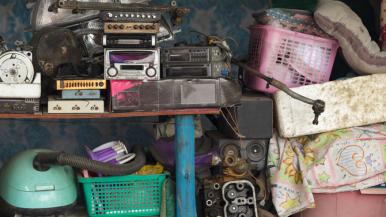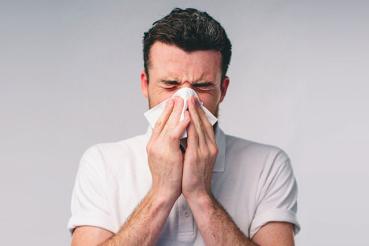"I hate housework. You make the beds, you wash the dishes and six months later you have to start all over again." — Joan Rivers
For health and safety's sake, it's probably best to get house cleaning on your calendar a little more often than semi-annually. In fact, putting off cleaning tasks and letting clutter pile up can actually have a serious impact on your physical and mental health.
We talked with Jennifer McDonnell, MD, a primary care physician at Rush, about some of the issues related to clutter and cleaning that she often addresses when talking with patients.
The problem: Respiratory issues
Dust and pet dander are two major triggers for asthma, which McDonnell says is a significant problem among children, especially those in urban areas. She estimates that 30 percent of the children she sees have some degree of asthma or allergies.
"Environmental allergens play a big part in the frequency and severity of asthma attacks," she explains. Mold and mildew are other common triggers, as is dust that's contaminated with droppings from pests like rats, mice and cockroaches.
But if you're buckling down to clean because someone in your house has respiratory issues, you need to pay attention to the cleaning products you use. Many products — especially those that are scented with citrus or pine — contain volatile organic compounds (VOCs) that can aggravate asthma.
Solutions:
- Declutter. Cluttered homes tend to harbor a lot of dust — after all, the less stuff you have, the fewer places dust can collect — so general decluttering is a great place to start.
- Vacuum frequently. To stay on top of dust and dander, McDonnell recommends vacuuming frequently with a vacuum that has a HEPA filter, which will trap and hold on to problematic particles. "Kids or anyone else with allergies should stay out of a room for a while after you've vacuumed the carpet," she adds, since disturbing the carpet fibers can send dust and dander into the air.
- Pest-proof your home. Frequent cleaning can also help keep household pests from settling in. "Make sure you get rid of any potential food sources for rodents or bugs," McDonnell says. "Clear dirty dishes and food debris out of the sink, seal up food containers and make sure your indoor and outdoor trash cans are pest-proof."
- Watch for water. Water leaks and damp areas can provide a place for mold and mildew to flourish. McDonnell recommends cleaning with a diluted bleach solution and making sure that the room is well ventilated to keep humidity down and discourage mold's regrowth.
- Choose low-VOC cleaning products. Or make your own natural cleaning products with ingredients like baking soda and white vinegar — an easy and inexpensive alternative. And just as when you clean with bleach, ventilation is important; run a fan, and open windows and doors to air out fumes.
When we're surrounded by stuff, we're much more distractible and less able to focus — and that's especially true for kids who are trying to read or do homework.
The problem: Dangerous falls
The Centers for Disease Control and Prevention's statistics are startling: Every year, one in three adults age 65 or older falls. And more than 2.5 million of them are treated in emergency rooms for fall-related injuries such as hip fractures and traumatic brain injuries.
About half of all falls happen inside the home, where clutter can be a serious hazard.
Solutions:
- Don't use rugs. "Getting rid of throw rugs is the first thing I recommend," says McDonnell, "since they're so easy to trip or slip on."
- Clear the floors. Keep floors as obstacle-free as possible by removing items like papers, books, clothes and shoes from stairs and other places where you walk.
The problem: Disrupted concentration
One not-as-obvious effect of living in a cluttered environment: Your ability to focus on tasks can suffer.
A 2011 study published in The Journal of Neuroscience used MRIs and other tools to map the brain's response to clutter and found that it can limit the brain's processing capacity. When we're surrounded by stuff, we're much more distractible and less able to focus — and that's especially true for kids who are trying to read or do homework.
Solutions:
- Stash stuff out of sight. A set of shelves outfitted with attractive bins and baskets can hide distractions like toys, craft supplies and reading materials.
- Purge. To keep clutter to a minimum, it's a good idea to go through the bins (plus closets, cabinets, drawers and kitchen pantries) once or twice a year to see what you can throw out, recycle or donate.
- Declutter in stages. If you're helping an older relative or friend clean out his or her home, McDonnell suggests doing it gradually rather than all at once, since disruptions in surroundings and routine can be difficult — particularly if the person has any level of dementia.
Keep up with the cleaning
After you do an initial deep cleaning, keeping up with it will help keep your family healthier. Break cleaning tasks into regularly scheduled chunks: kitchen on Monday, bathrooms on Tuesdays, mopping floors on Wednesdays, and so on.
McDonnell recommends "slow and steady" as opposed to infrequent, stressful major cleanings. "You need to find the approach that you're most likely to stick with."




